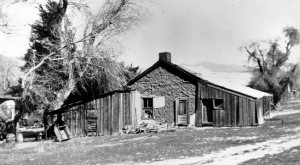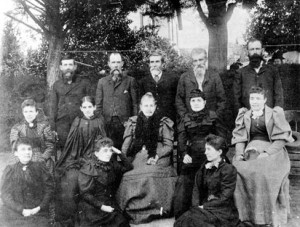(I have been sidelined this week, working on a chapter of The Golden Road, and discovering about the place where Fredi and the herd of Texas cattle would have finished in California)
California marked the high tide-line of the Spanish empire in the New World. The great wave of conquistadors washed out of the Iberian Peninsula in the fifteenth century looking for gold, honor, glory and land, roared across the Atlantic Ocean, sweeping Mexico and most of South America in consecutive mighty tides, before seeping into the trackless wastes of the American Southwest. Eventually that tide lapped gently at the far northern coast, where it dropped a chain of missions, a handful of military garrisons and small towns, and bestowed a number of property grants on the well-favored and well-connected. There has always been a dreamlike, evanescent quality to that time – as romantic as lost paradises always are. Before the discovery of gold in the millrace of a saw-mill built to further the entrepreneurial aims of a faintly shady Swiss expatriate named John Sutter, California seemed a magical place. It was temperate along the coast and perceived as a healthy place; there were no mosquito-born plagues like malaria and yellow fever, which devastated the lower Mississippi/Missouri regions in the 19th century. Certain parts were beautiful beyond all reasoning, and the rest was at the least attractive. The missions, dedicated primarily to the care of souls also had an eye towards self-sufficiency, and boasted great orchards of olives and citrus, and extensive vineyards. The climate was a temperate and kindly one in comparison with much of the rest of that continent; winters were mild, and summers fair.
It was a rural society of vast properties presided over by an aristocracy of landowners who had been granted their holdings by the king or civil government. Their names still mark the land in the names of towns, roads and natural features; Carrillo, Sepulveda, Verdugo, Vallejo, Dominguez, Pico, Castro, Figueroa, and Feliz, among many others. They ran cattle or sheep on their leagues – the hard work was mostly performed by native Californian Indians; those who had survived such epidemics as were brought inadvertently by Europeans and who were amenable to being trained in useful agricultural skills. These vast estates produced hides, wool and tallow; their owners lived lives of comfort, if no very great luxury. From all accounts they were openhandedly generous, amazingly hospitable, devout … a little touchy about personal insult and apt to fight duels over it, but that could said of most men of the 18th and early 19th centuries.
One of the notable estates was that which lay around the present-day hamlet of Warner Hot Springs. Besides being a very fine property, it was also located the southern emigrant trail – that which ran through south Texas and New Mexico territory to Yuma, at the confluence of the Gila and Colorado Rivers, and terminated in Los Angeles. Eventually, the Butterfield stage line would follow this trail – and the ranch at the place where the road to San Diego diverted from it became a stage stop. The property also was the object of considerable legal wrangling – it was inadvertently granted to two different claimants; Silvestre de la Portila in 1836, and transplanted Yankee, John Joseph ‘Juan Jose’ Warner eight years later. Juan Joseph Warner built an adobe house on the property, and conducted ranching and trading operations until an uprising by local Indians drive him out in 1851. In the meantime, Silvestre de la Portila had deeded the property to Vincenta Sepulveda, the daughter of a long-established and important local family. Eventually, the powers that be decided in favor of Dona Vincenta, who at the age of 21 had married another scion of a well-to-do ranch family, Tomas Antonio Yorba, who was more than twice her age. Yorba and his wife set up first at his family property at Santa Ana, in present-day Orange County, where they ran cattle for their hides and tallow, and operated a small general store, trading all kinds of general goods, groceries and luxuries. Their house was a rather splendid one; they impressed many visitors with not only the generous nature of their hospitality, but order and luxury of their house – better adorned and furnished than the usual hacienda. After ten years of productive and apparently happy marriage Tomas Yorba died, leaving his wife the residence, large herds of sheep and cattle, considerable jewelry and the care of their four surviving children. She continued managing the property, her household and her business; a wealthy, attractive and able young woman. She did not remain a widow for very long; she married again, to Jose Ramon Carrillo, of San Diego, who had managed a large property in northern California. Romantically, they met at the wedding of Dona Vincenta’s niece to an office of the Mexican army. Jose Ramon Carrillo had a reputation for physical courage, which was not based solely on his experiences as a soldier. (He had engaged in several skirmishes between Californios and the Anglo members of the Bear Flag party, or during the Mexican War and in fighting with hostile local Indians, which was pretty much what had been expected of a man of his age and class.) But his most famous fighting exploit wasn’t with other men at all – it was with a bear.
When out riding with friends in the Sonoma foothills some time before his marriage, the party spotted a bear, at some distance. Carrillo proposed (and there is no evidence that liquor was involved in any) that he fight the bear … on foot and alone. He took a mochila from his saddle – a flap of leather used to attach saddle-bags and wrapped it around his left arm – and a large hunting knife with a keen blade in his right. When he advanced on the bear, it charged him; Carrillo shielded himself with his left arm, and thrust with the knife into the bear’s torso. Within a very short time, the bear lay dead before him. On another occasion, Carrillo attempted to lasso another bear, from horseback. In the heat of the chase, bear, horse and rider fell into a five or six foot deep chasm, hidden until that very moment by dense brush. The abruptness of the fall removed all fight from the bear – and it tried to scramble up the steep side of the pit. Realizing that there was no scope for fighting the bear in the ditch and that discretion might be the best part of valor, Carrillo braced himself under the bear’s hindquarters and gave a good push with all of his strength. The bear scrabbled at the edge of the pit, got over it and promptly ran away.
By the mid-1850s, Dona Vincenta had clear title to the former Warner property; she and her new husband moved there, built an even grander house – an establishment which also served as a stage station, and on the eve of the Civil War, Don Ramon Carrillo applied for the position of post-master … the rancho was also a post office. During the war itself, he also served as a spy and scout for the Union Army in the Sonora. There were shadows falling on him, however; a political and business rival was found dead, shot in the back by person or persons unknown late in 1862. He was interviewed under oath by a court in Los Angeles, and released – the court having found nothing to charge against him.
Two years later, Don Ramon also fell to an assassin’s ambush. The murderer – again – was never identified, and at the age of 51, Dona Vincenta was again a widow. She continued to manage the ranch, with the aid of her grown son for another five or six years, before moving to Anaheim, and to a long retirement in the house of her married daughter; Dona Vincenta lived to the age of 94. The ranch property was sold in the 1870s, continuing as a profitable sheep ranch for the remainder of the century and into the next. The site is now a museum, and open to the public.


Recent Comments